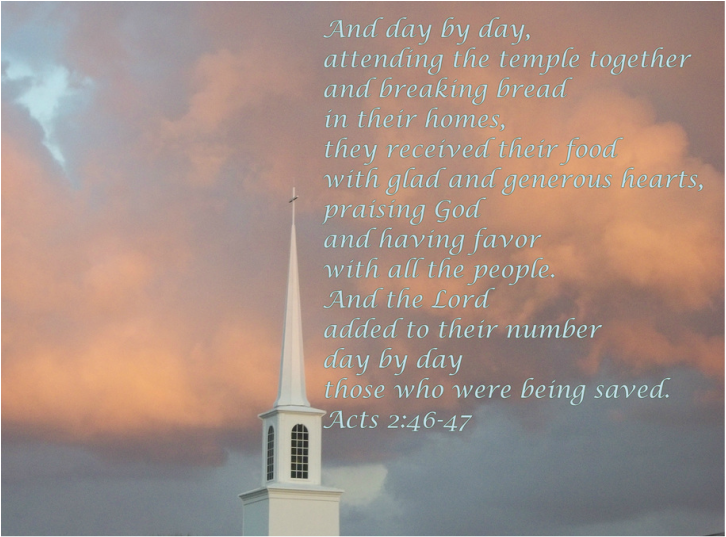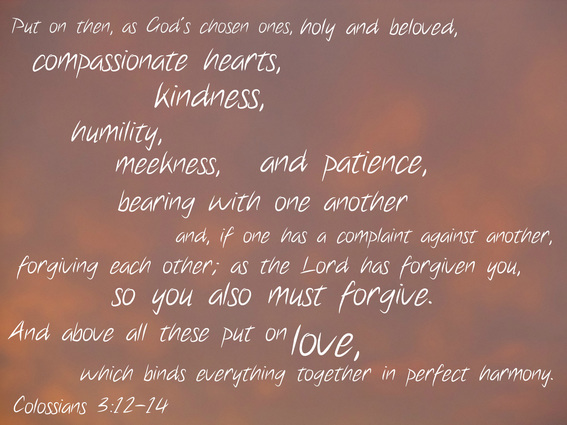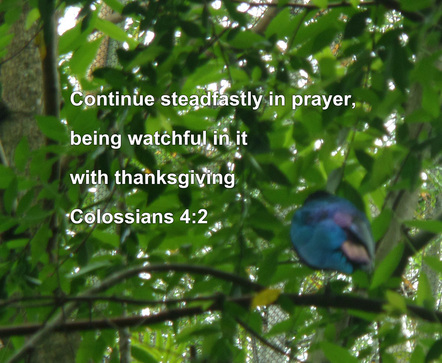We, the body of Christ are a community of people who love one another in real and tangible ways. Without the fellowship of the church, it is very difficult for a Christian to be comforted through sufferings, mature in Christ, or walk in the Spirit. The final chapter of Paul’s letter to the Colossians begin with a continuation of the picture of how maturing Christians should behave. Verses 1-6 read,
“Masters, treat your bondservants justly and fairly, knowing that you also have a Master in heaven.
2 Continue steadfastly in prayer, being watchful in it with thanksgiving.3 At the same time, pray also for us, that God may open to us a door for the word, to declare the mystery of Christ, on account of which I am in prison— 4 that I may make it clear, which is how I ought to speak.
5 Walk in wisdom toward outsiders, making the best use of the time.6 Let your speech always be gracious, seasoned with salt, so that you may know how you ought to answer each person.”
Verses 18-25 of chapter 3 talk about the maturing Christians’ relational behavior and verse 1 of this chapter carries that thought on. Paul directed: Wives, submit to your husbands. Husbands, love your Children, obey your parents in everything, for this pleases the Lord. Fathers, do not provoke your children. Bondservants, obey in everything those who are your earthly masters. Whatever you do, work heartily, as for the Lord and not for men.
Our behavior, the way the new-self lives as the image of Christ, continues from how we relate to one another to how we relate to The Lord. How we relate to the Lord enhances how we relate to one another. We are told to pray steadfastly being watchful and thankful. Steadfastly means persistently consistently, unwaveringly, with conviction, and faithfully. We pray not only for ourselves, being aware of our deficits and being thankful for all things in our lives but we pray for one another. We pray for our ministries, for the spreading of the Gospel, and our sufferings.
Mature behavior, that is behavior that exemplifies Christ also impacts how we relate to the world. We walk in wisdom toward non-Christians. The Greek word for wisdom sofia means higher spiritual understanding, clarity, insight, skill (human or divine), and intelligence. The time we have with non-Christians may be limited, they may only cross our paths once. We are called not to waste that time foolishly but to make the best use of it. The best use of that time is to embody The Lord, The Word of God and His Spirit to His glory. We therefore act in graciousness which is defined in Strong’s as kindness through the Lord’s influence on our hearts, expressed as accepting, benefice, favor, giving, mercy joy, liberality, pleasure, and being worthy of thanks. We are to speak seasoned with salt, the saving power of Jesus Christ so that we can answer each person.
Every meeting we have is an opportunity to share Jesus. It may not be an obvious recitation of the Gospel. It could be a few sentences of testimony, an act of love, or a show of kindness in Jesus’ name but it should always be to God’s glory. Peter said,
“But even if you should suffer for righteousness' sake, you will be blessed. Have no fear of them, nor be troubled, but in your hearts honor Christ the Lord as holy, always being prepared to make a defense to anyone who asks you for a reason for the hope that is in you; yet do it with gentleness and respect, having a good conscience, so that, when you are slandered, those who revile your good behavior in Christ may be put to shame. For it is better to suffer for doing good, if that should be God's will, than for doing evil.” (1 Peter 3:14-17).
Paul lived out what he wrote to the churches. He wrote this letter and so many of his others from prison. He never let an opportunity to glorify Jesus pass him by. He loved the body of Christ. His letters show his deep feeling for his brothers and sisters, his spiritual children, and his co-workers for Christ. They show his deep devotion and ardor for The Lord. They show his willingness to tell every person he came across about Jesus.
Paul an apostle of Jesus Christ, called after Jesus ascended to Heaven, who is responsible for carrying God’s will of salvation to the gentile world did not live his Christian life alone. He lived it with his brothers and sisters in Christ. Verses 7-18 show us that very clearly.
“Tychicus will tell you all about my activities. He is a beloved brother and faithful minister and fellow servant in the Lord. 8 I have sent him to you for this very purpose, that you may know how we are and that he may encourage your hearts, 9 and with him Onesimus, our faithful and beloved brother, who is one of you. They will tell you of everything that has taken place here.
10 Aristarchus my fellow prisoner greets you, and Mark the cousin of Barnabas (concerning whom you have received instructions—if he comes to you, welcome him), 11 and Jesus who is called Justus. These are the only men of the circumcision among my fellow workers for the kingdom of God, and they have been a comfort to me. 12 Epaphras, who is one of you, a servant of Christ Jesus, greets you, always struggling on your behalf in his prayers, that you may stand mature and fully assured in all the will of God. 13 For I bear him witness that he has worked hard for you and for those in Laodicea and in Hierapolis. 14 Luke the beloved physician greets you, as does Demas. 15 Give my greetings to the brothers at Laodicea, and to Nympha and the church in her house.16 And when this letter has been read among you, have it also read in the church of the Laodiceans; and see that you also read the letter from Laodicea. 17 And say to Archippus, “See that you fulfill the ministry that you have received in the Lord.”
18 I, Paul, write this greeting with my own hand. Remember my chains. Grace be with you.”
Tychius, Onesimus, Aristarchus, Mark, Justus, Epaphras, Luke, Demas, and Nympha are all mentioned by name as being his beloved brothers and sister, co-workers, and co-servants giving him comfort and praying for the church.
Tychius and Onesimus most likely delivered this letter to the church at Colossae and they would also tell the church all that had happened during their visit to Paul in prison. We joyfully share the work of our ministries with each other so as to encourage, embolden, and instruct one another.
Onesimus was a slave to Philemon but had run away, met Paul and become a believer. Because of Paul’s intervention Philemon did not punish Onesimus as he could have (Philemon). It appears that Philemon may have released Onesimus from his servitude and or at least let him serve Paul. Either way, Philemon and Onesimus were master and bondservant in one life and brothers in their lives in Christ. We may have employers, mothers, and fathers in the world but when we are Christians they are our brothers and sisters. Our position in the world is not the same as our position in Christ. In Christ there is no Greek or Jew and no slave or master; we are one in Christ, equals with each other (Galatians 3:28).
Mark had at one time deeply disappointed Paul and for some time Paul did not let Mark work with him (Acts 15:36-41). But Mark learned, he matured and the two reconciled. Paul directed the church to welcome him and no longer hold his past against him. We too cannot hold pasts, present immaturity, or sins against one another. Mark and Justus had been the only comfort from the Jewish Christians that Paul had. We have to ignore denominational lines and remember we are one church, one body with one Spirit. Ephesians 4:1-7 reads,
“I therefore, a prisoner for the Lord, urge you to walk in a manner worthy of the calling to which you have been called, 2 with all humility and gentleness, with patience, bearing with one another in love, 3 eager to maintain the unity of the Spirit in the bond of peace. 4 There is one body and one Spirit—just as you were called to the one hope that belongs to your call— 5 one Lord, one faith, one baptism, 6 one God and Father of all, who is over all and through all and in all. 7 But grace was given to each one of us according to the measure of Christ's gift.”
Paul pointed out the sincerity and intensity of Epaphras’ prayers for the church and their maturation. We too should care that deeply for one another’s walks as much as our own to pray for one another with the grace of Epaphras.
Nympha hosted a church in her home. She opened her home so that people could meet together, fellowship, learn and mature. Her hospitality made the church in Colossae possible. We have to care enough to meet together. It is in gathering together that we are able to mature in Christ and walk steadfastly in The Spirit. Hebrews 10:24-25 reads,
“And let us consider how to stir up one another to love and good works, 25 not neglecting to meet together, as is the habit of some, but encouraging one another, and all the more as you see the Day drawing near.”
Believer, you cannot walk in Christ without His body. You cannot mature and so become the image of Christ without the example of who He is around you teaching you to love as He loves. You cannot be comforted and honed by the Spirit if you are the not around those who share His Spirit with you. You need the church and the church needs you.







 RSS Feed
RSS Feed
